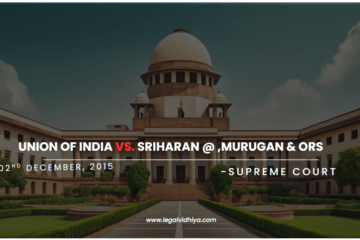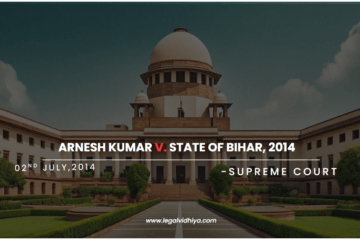| CITATION | (2014) 5 SCC 345 |
| DATE OF JUDGMENT | 28 February, 2014 |
| COURT | Supreme Court of India |
| APPELLANT | State Of Rajasthan |
| RESPONDENT | Parmanand & Another |
| BENCH | Madan B Lokur, Ranjana Prakesh Desai. |
INTRODUCTION
State of Rajasthan v. Parmanand and Anr dated February 28, 2014 is an important and notable case in the Indian Judicial system. This case involves the State of Rajasthan as an appellant and Parmanand and Anr as the respondent. This case is related to the Section 50 of the NDPS Act, 1985, showing how significant it is to act in compliance with the said provision to uphold the law. In the year of 2014 it was decided by the Supreme Court of India.
FACTS OF THE CASE
At 7:00 PM dated October 13, 1997, P.N. Meena, a Sub-Inspector at the Office of the Narcotics Commissioner, Kota, learned that the respondents intended to give a smuggler approximately 10 kg of opium on October 14, 1997, between 4:00 AM to 6:00 AM at Nangdi-Tiraha, Iklera, Chhipabarod Road. SI Meena jotted down the details in his diary and sent it to the Superintendent, J.S. Negi, the Investigating Officer. J.S. Negi followed by sending this information to the Assistant Narcotic Commissioner, Kota, via Constable B.L. Meena. J.S. Negi, the superintendent, organised a raiding party.
They took a government vehicle to Nangdi-Tiraha. SI Qureshi called the independent witnesses Ramgopal and Gopal Singh, and got their permission to witness the operation. The raiding party spotted the respondents, who were coming from the village of Rajpura, at approximately 4:25 AM in the morning on October 14, 1997. They saw the raiding party and tried to run away, but were caught.
In the presence of independent witnesses, SI Qureshi advised respondents about right to have a search conducted in front of the closest magistrate or other gazetted officer in accordance with Section 50(1) of the NDPS Act. The respondents gave their consent for SI Qureshi to search them in front of Superintendent J.S. Negi.
Respondent Surajmal provided written consent in Hindi for himself and respondent Parmanand, along with his thumb impression, after receiving written notice. When Parmanand’s white gunny bag was searched, a polythene bag containing black substance and the respondents recognised it as opium, of about 9 kg or 600 g were present.
The required steps were taken to draw samples and seal the evidence. After that, the responders were taken into custody. Sections 8 and 18 of the NDPS Act were used to charge Respondent No. 1, Parmanand. Section 8 r/w Section 18 and Section 8 r/w Section 29 of the Narcotic Drugs and Psychotropic Substances Act, 1985, (hereinafter referred as NDPS Act) were the charges brought against Respondent No. 2, Surajmal. Eleven witnesses were questioned by the prosecution, including PW-5 J.S. Negi, PW-9 SI Meena, and PW-10 SI. The respondents pleaded not guilty to the charge. They maintained that the police witnesses had fabricated a story and were being set up and the claim is false.
Each of the two respondents received a fine of Rs. 10 lakhs along with a sentence of ten years of hard labor, by the Learned Session Judge. If the fine was not paid, they would have to serve an extra two years of hard time in prison. The respondents appealed the Learned Special Judge’s decision in the Rajasthan High Court because they were upset with it. By its contested ruling, the High Court cleared the responders of all charges. The State of Rajasthan has filed this appeal to contest the Rajasthan High Court’s decision to acquit the respondents.
ISSUE RAISED
- Whether the section 50 of NPDS Act was violated or not?
CONTENTIONS OF APPELANT
- The State of Rajasthan’s attorney, Mr. Imtiaz Ahmed, contested the ruling of the Rajasthan High Court that PW-10, SI Qureshi, specifically mentioned that the respondents were made aware of their rights under NDPS Act Section 50(1). The High Court came to a erroneous stopping point that Section 50 of the NDPS Act was breached.
- The respondents received a written notice outlining their rights under Section 50(1). Only after the respondents gave consent for PW-10 SI Qureshi to search them in front of PW-5, Superintendent J.S. Negi, did the search take place.
- It was contended that The learned Counsel contended that the search of Respondent No. 1 Parmanand’s bag and the respondents’ person was carried out strictly in accordance with the law and that the respondents’ consent had been obtained.
- It was an error on the part of the High Court to reject the testimony of the independent witnesses. Counsel argued that the prosecution’s case was strengthened by the witnesses’ credible testimony. Counsel argued that the facts and evidence presented contradict the High Court’s order, which is nonsensical.
- He pleaded for the reinstatement of the Learned Special Judge’s conviction and sentence, as well as the setting aside of the contested order clearing the respondents.
CONTENTIONS OF RESPONDENT
- The attorney representing the respondents, Ms. Nidhi, made an argument in support of the High Court’s ruling to exonerate the respondents. It is accurate to say that a joint notice was given in compliance with Section 50 of the NDPS Act. The legal representative maintained that each respondent had a right to a separate notice. This procedural error therefore makes the search void.
- The legal representative cited rulings from the Bombay High Court in Dharamveer Lekhram Sharma and Others v. The State of Maharashtra and Others and the Punjab and Haryana High Court in Paramjit Singh and Others v. State of Punjab. These cases lend credence to the argument that the search was unlawful due to the absence of the necessary Section 50 specific notices. The counsel contended that the search was carried out in an absurd way and was illegal.
- Counsel argued that the defective search process was the reason the respondents were properly acquitted by the High Court. It was argued that the High Court’s decision should be upheld because it accurately highlighted the shortcomings in both the prosecution’s case and the search procedure.
JUDGEMENT
The Supreme Court of India held there was a breach of provision 50(1) of NPDS Act, when determining whether the provision 50 of NPDS Act was violated or not. Even though Parmanand received written notice and were made aware of their rights under section 50 of the aforementioned Act, the Court could not find any evidence of their independent consent; therefore, the notice was joint rather than individual. The accused must be informed of their right to have a search conducted in front of the closest gazetted officer or magistrate, as required by Section 50 of the NDPS Act. The Supreme Court emphasised this point in previous rulings. It was emphasised how crucial it was to give each accused person this information in a clear, concise, and customised way.
The Court found that the provision’s goal of protecting the accused from possible false involvement is defeated when the right under Section 50(1) is communicated jointly. Parmanand’s rights under Section 50 were not appropriately disclosed due to his lack of consent and personal communication. The raiding party member PW-5 J.S. Negi was improperly granted the right to be searched, the Court argued. This option is prohibited by Section 50(1) and goes against the intention of having an impartial officer present during the search.
The process used in this case, according to the Supreme Court, was against Section 50(1) of the NDPS Act. The incorrect inclusion of an invalid third option and the lack of individual notice rendered the search invalid. Thus, the judgement was also tainted because it was predicated only on the conclusion that Respondent No. 1 Parmanand’s bag contained opium. Thus, the High Court’s acquittal was maintained and the State’s appeal was dismissed.
ANALYSIS
The main question in this case concerned whether the respondents had received adequate notice of their right to have their property searched in front of a gazetted officer or the closest magistrate, as stated in Section 50 of the NDPS Act. The Supreme Court emphasised the significance of interpersonal communication with regard to this entitlement. A serious procedural error was revealed when separate notices were sent to each respondent rather than depending on a joint notice signed by all respondents (Surajmal).
The procedural safeguards provided by Section 50 are more than just formalities, the Supreme Court emphasised; they are essential to maintaining justice and defending the rights of the accused. The Court noted that by permitting the search to occur while PW-5 J.S. Negi, a member of the raiding party, was present, the third option further diminished the rights that Section 50 was meant to protect. This error alone, along with the problem with the joint notice, was enough to void the search and the subsequent convictions for the responders.
CONCLUSION
To conclude, the case looks at whether respondents received sufficient notice of their Section 50 rights and whether police officers were authorised to search and seize property. The decision rendered in this case by the Supreme Court has important ramifications for the strict observance necessary to guarantee the defence of the accused’s rights and the procedural safeguards in drug cases.
REFERENCE
- https://indiankanoon.org/doc/155481249/
- https://narcoordindia.in/Judgements/1656327046-1552-DOC-State_Of_Rajasthan_vs_Parmanand_And_Anr_on_28_February_2014.PDF
This Article is written by Aleeza student of Ziauddin University Faculty of Law, Politics and Governance; Intern at Legal Vidhiya.
Disclaimer: The materials provided herein are intended solely for informational purposes. Accessing or using the site or the materials does not establish an attorney-client relationship. The information presented on this site is not to be construed as legal or professional advice, and it should not be relied upon for such purposes or used as a substitute for advice from a licensed attorney in your state. Additionally, the viewpoint presented by the author is of a personal nature.




0 Comments